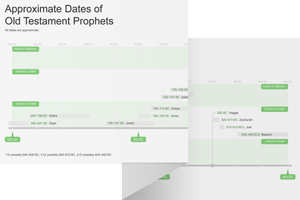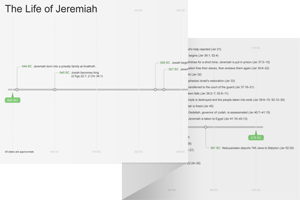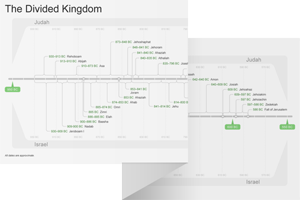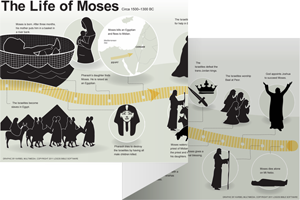1:1–3 Jeremiah |
1:1 Jeremiah A popular name in Israel belonging to 10 ot figures.
Hilkiah A name belonging to five other figures in the ot.
Anathoth A village a few kilometers north of Jerusalem. Abiathar, one of the two officiating high priests of King David, was exiled there with his family after Solomon was installed as king over Israel (1 Kgs 2:26–27).
the land of Benjamin In his preaching, Jeremiah occasionally refers to his tribal affiliation. He calls the Benjaminites to leave Jerusalem in an oracle of destruction (6:1). Jeremiah 31:15 portrays the mother of Benjamin, Rachel, weeping for her children in Ramah. In isolating Benjamin from the other ancient tribal groups, Jeremiah is likely highlighting his Benjaminite roots.
One of the 12 tribes of ancient Israel. Their territory bordered Judah to the north, not far from Jerusalem. When the northern tribes led by Jeroboam rebelled against Rehoboam, the son of Solomon, David’s heir, at least some of the tribe of Benjamin remained loyal to Rehoboam (1 Kgs 12:21). During the period of the divided kingdom, Benjamin’s national allegiance wavered between Israel and Judah. The border between the northern and southern kingdoms cut through the territory allotted to the tribe of Benjamin. |
1:2 to whom the word of Yahweh came This phrasing differs from the typical Hebrew construction for introducing prophetic revelation: “The words of Jeremiah … (to whom was the word of Yahweh).”
Josiah Josiah was the last of the “good kings” in the Deuteronomistic History;
was the last of the “good kings” in the Deuteronomistic History; he had a considerable effect on the life and theology of Jeremiah (2 Kgs 22–23).
he had a considerable effect on the life and theology of Jeremiah (2 Kgs 22–23).
the thirteenth year of his reign Approximately 628–626 bc.
1:3 Jehoiakim Ruled from 609–598 bc.
Zedekiah A puppet king installed by Nebuchadnezzar II as a vassal of Babylon. He ruled from 597–586 bc. The prophet is less severe in his criticism of Zedekiah than in his criticism of Jehoiakim.
fifth month The fall of Jerusalem occurred on the ninth day of the month of Tammuz, 586 bc.
 Israelite Calendar Table
Israelite Calendar Table
1:4–19 Isaiah, Jeremiah, and Ezekiel each record an experience of calling or commissioning by Yahweh. This calling identifies their mission and message. Every prophet’s call is unique and informs the reader of the content and purpose of the entire book. |
 Prophetic Commissioning and the Divine Presence
Prophetic Commissioning and the Divine Presence
1:4 the word of The Hebrew term here can be translated as “word,” “event,” or “matter.” In the context of the prophetic experience, the word of Yahweh is experienced as a real auditory, visual, and physical event.
1:5 formed This term is typically used to describe the process of shaping pottery. It appears in Gen 2:7 as part of God’s act of creating the first human from the dust of the earth.
I knew The Hebrew verb for “to know” is used to describe the most intimate of relationships.
in the womb The idea that God created Jeremiah for a specific purpose forms a play on words with Jeremiah’s name, which could mean “may Yahweh loosen the womb” (see note on Jer 1:1). If this is the case, then Jeremiah’s prophetic call begins at birth.
I consecrated you Jeremiah has been set apart or consecrated for a special purpose or task. This phrase completes a triad, “I formed you … I knew you … I consecrated you,” which defines what it means for Jeremiah to be a prophet to the nations. Unlike other prophets from Israel’s past, Jeremiah has been designated to communicate the voice of God to foreign powers and kings as well to Israel and Judah.
as a prophet to the nations Jeremiah’s ministry to the nations surrounding Judah is an important theme in Jer 46–51.
1:6 a youth His objection is that he is not yet a man according to ancient Israelite standards; he is still under 20, quite likely 12–16 years old at the time of his calling. Jeremiah’s protestation that he does not know how to speak parallels Moses’ objection in Exod 3:10. His distinction as a boy is similar to Samuel’s call in 1 Sam 3:1–14.
1:7 you will go The instruction by God presents Jeremiah as a royal envoy: He is commissioned to relay God’s decrees to whomever He designates.
you will speak The expression forms a parallel with the ideal prophet like Moses in Deut 18:18. Jeremiah’s calling is a fulfillment of this divinely appointed office.
1:8 I am with you Yahweh’s reassurance of His presence is a common theme throughout the ot (Exod 3:12; Josh 1:5; Judg 6:16). The very name of Yahweh, disclosed to Moses in Exod 3:14, means “I am who I am.” It contains an implicit promise of His presence. In Moses’ call in Exod 6:1–8, the promise of deliverance accompanies Yahweh’s presence.
1:9 stretched out his hand The image of Yahweh extending His hand and touching Jeremiah’s mouth is reminiscent of Isaiah’s call in Isa 6:6–7, in which one of the angels in God’s presence touches Isaiah’s mouth with a hot coal.
my words The prophet’s role as a messenger involved faithfully communicating the words of the one who sent him.
1:10 I appoint Refers to Jeremiah’s divinely commissioned office as prophet to the nations.
to build and to plant While Jeremiah’s ministry is destructive, it contains constructive elements, as well (compare Jer 29:1–28; 31:4–5).
1:11 the word of Yahweh A common introduction to a prophetic oracle of Yahweh. It is phrased differently from the first appearance of the word of Yahweh in v. 2.
What are you seeing, Jeremiah? The beginning of two visions that are part of Jeremiah’s calling. This forms a parallel with Moses’ call in Exod 4:1–9, where he performs two miraculous signs.
a branch of an almond tree The phrase maqqel shaqed may also be translated “a branch of the Watchful Tree” (njb). The blossoming almond branch indicates that Yahweh’s words are about to take place.
1:12 am watching The Hebrew term shoqed, which is often translated as “watching,” forms a play on words with the almond tree, shaqed (Jer 1:11).
my word to perform it The first oracle in vv. 5–10. It has been spoken, but its fulfillment lies in the future.
1:13 a boiling pot The Hebrew words used here literally mean “a blown pot.” This image and its role in the interpretation in v. 14 is not straightforward. Most likely, this is a cooking pot sitting outside with steam from the boiling water being fanned or “blown” by the wind. Compare the metaphor of the cooking pot in Ezek 11:11–12.
face is from the face of the north If the wind is blowing the steam from the pot as suggested above, then the wind is coming from the north and blowing the steam southward.
1:14 From the north A looming disaster from the north is a common image in Jeremiah and is symbolic of Babylon (compare Jer 50:9). While the Babylonian Empire lay directly east of Jerusalem, any militarized force proceeded around the Arabian Desert and entered the Palestinian region from the north before moving southward to Jerusalem.
disaster will be unleashed The Hebrew phrase used here can be literally read as “disaster will be opened up.” The unusual phrasing may stem from its correspondence to the vision in which the boiling water overflows from the pot.
the inhabitants of the land The residents of Jerusalem and the surrounding region.
1:15 all the clans of Not the 10 tribes of the now-extinct kingdom of Israel; rather, a coalition of foreign nations subservient to Babylon through treaties (25:8–9).
the gates of Jerusalem In the ancient Near East, the city gates functioned as a civic center where city officials, merchants, and leaders met to discuss politics and business, and where rulers administered judgment (e.g., Deut 16:18; 17:5). If foreign invaders possessed the city gates, it meant that the city had been conquered (see Gen 22:17; 24:60). After the siege of Jerusalem, the officials of Babylon took seats of judgment in the city gates (Jer 39:3).
against all the cities of Judah The people depend on fortified cities, such as Gezer and Lachish in the Judean hill country, for safety and preservation.
1:16 judgments The word here refers to judgments rendered in a court.
they have forsaken me This is a summary of the following indictments. The charge of desertion is a major theme in the book of Deuteronomy (Deut 28:20; 31:16). It appears frequently in the oracles of Jeremiah (Jer 2:13, 17, 19; 5:7, 19). This charge reinforces the connection between Jeremiah and the theology in Deuteronomy.
the works of their hands Accusations of idolatry form the basis for many of Jeremiah’s oracles (7:8–10; 11:10; 19:4, 13; 25:6; 44:3–15).
1:17 you must gird your loins A phrase that denotes preparation for a strenuous task. The tunics customarily worn by men at this time needed to be held in place by a waist belt; men tightened them whenever they prepared for physical work or travel (1 Kgs 18:46; 2 Kgs 4:29). Jeremiah’s prophetic activity will be arduous and exhausting.
stand, and speak The imperative verbs work as a pair. This is God’s direct command to Jeremiah to begin his prophetic work.
Do not be afraid The word here means “to be broken” or “shattered.” In context, the phrase is perhaps best translated as “don’t fall apart.”
or I will shatter you Jeremiah is warned that if he breaks down, God may physically destroy him in the presence of his enemies.
1:18 have made The Hebrew wording here is the same as that used to describe Jeremiah’s appointment as a prophet in v. 5 and 1:9. The promise to strengthen Jeremiah is directly connected to the call narrative in vv. 4–10; for Jeremiah, it functions as an arsenal of reinforcements for his mission. There may be a parallel between this promise and Yahweh’s provision to Moses for aid from his brother, Aaron, in Exod 3:13–17.
a fortified city and as an iron pillar Images of a siege campaign.
the kings of Judah The triad of kings, officials (or princes), and priests parallels the call of Jeremiah to prophesy against nations in Jer 1:10.
1:19 they will not prevail Despite the fierce opposition Jeremiah faces, Yahweh assures him that he will overcome. Yahweh warns of consequences for failure in v. 17, but He also promises that Jeremiah will fulfill his mission.
declares Yahweh The Hebrew expression here commonly indicates a divine declaration; the promise is a confirmation of God’s earlier pledge to be with Jeremiah. See v. 8 and note.

|
About Faithlife Study BibleFaithlife Study Bible (FSB) is your guide to the ancient world of the Old and New Testaments, with study notes and articles that draw from a wide range of academic research. FSB helps you learn how to think about interpretation methods and issues so that you can gain a deeper understanding of the text. |
| Copyright |
Copyright 2012 Logos Bible Software. |
| Support Info | fsb |
 Loading…
Loading…


 The Tribe of Benjamin
The Tribe of Benjamin 



